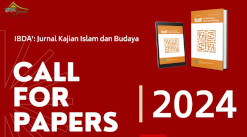Literature Review of Spiritual Care in Islamic Cultural Perspective
DOI:
https://doi.org/10.24090/ibda.v16i2.1942Keywords:
literature review, spiritual care, Islami, cultureAbstract
This article aims to literature review regarding spiritual care in Islamic culture perspective. Systematic review is done to support knowledge regarding spiritual care. Literature studies from 2007 to 2017 are identified narratively and reviewed critically in Islamic cultural perspectives. The method for literature analysis is using eight steps from Walker and Avant. The findings of this review stated that spiritual care is a dynamic activity to integrate physical, psychological, social, and spiritual aspects. Spiritual care takes the form of spiritual service that is done dynamically and integratively based on divine and human values especially Islamic cultural values. The main services include caring for the sick, identifying spiritual needs, and increasing spiritual well-being. The implications of the findings are to help building policies in nursing and to help nurses in developing positive attitude in applying spiritual care. The conclusion of this literature review produces a comprehensive definition regarding spiritual care and supports spiritual care competency in health in Islamic cultural perspective.Downloads
Download data is not yet available.
References
Abuatiq, A. (2015). Spiritual care for critical care patients. International Journal of Nursing & Clinical Practices, 2, 2–5.
Asadi-Lari, M., Madjd, Z., & Goushegir, S. (2008). Gaps in the provision of spiritual care for terminally ill patients in Islamic societies - a systematic review. Advances in Palliative Medicine, 7(2), 73–80.
Baldwin, M. ., & Rose, P. (2009). Concept analysis as a dissertation methodology. Nurse Education Today, (29), 780 783
Burkhart, L., & Hogan, N. (2008). An experiental theory of spiritual care in nursing practice. Quality Health Research, 18(7), 928–938. https://doi.org/10.1177/1049732308318027
Burnell, L., & Agan, D. L. (2013). Compassionate care/ : can it be defined and measured/ ? the development of the compassionate care assessment tool. International Journal of Caring Sciences, 6(2).
Carr, T. (2008). Mapping the processes and qualities of spiritual nursing care. Quality Health Research, 686–700(5), 686–700. https://doi.org/10.1177/1049732307308979
Chiang, Y., Lee, H., Chu, T., Han, C., & Hsiao, Y. . (2016). The impact of nurses’ spiritual health on their attitudes tiward soiritual care, professional commitment, and caring. Journal of Nursing Outlook, 64(2), 215—224.
Dewiyanti, D., & Kusuma, H. E. (2012). Spaces for Muslims Spiritual Meanings. Social and Behavioral Sciences, 50, 969 – 978. https://doi.org/doi: 10.1016/j.sbspro.2012.08.098
Dossey, B. . (2008). Theory of integral nursing. Research Policy (in press).
Ezenkwele, U. A., & Roodsari, G. S. (2013). Cultural Competencies in Emergency Medicine/ : Caring for Muslim-American Patients from the Middle East. The Journal of Emergency Medicine, 45(2), 168–174. Retrieved from http://dx.doi.org/10.1016/j.jemermed.2012.11.077
Fisher, J. . (2009). Reaching the heart/ : assesing and nurturing spiritual wellbeing. Drive.
Frankl, V. . (1992). Man’s search for meaning an intruduction to logotherapy (4th ed.). Massachussetts: Beacon Press.
Hefti, R., & Esperando, M. R. . (2016). The interdisciplinary spiritual care model/ : a holistic approach to patient care. Journal of Religion and HEalth, 14(41), 13–47.
Hodge, M., & Horvart, V. . (2011). Spiritual needs in health care settings/ : a qualitative meta synthesis of clients perspective. Social Work, 56, 306– 316.
Holloway, M., Adamson, S., McSherry, Swinton, W., & John. (2011). Spiritual Care at the End of Life: a systematic review of the literature. Universties of Hu , Staffordsh re and Aberdeen.
Hughes, B., & Handzo, G. (2014). Spiritual care handbook. San Diego State: University Press.
Joshanloo, M. (2013). A Comparison of Western and Islamic Conceptions of Happiness. Journal Happiness Study, 14, 1857–1874. https://doi.org/DOI 10.1007/s10902-012-9406-7
Ku, Y. . (2017). Literature review on spiritual care in nursing. Journal Nursing Health Studies, 2(1), 5.
McSheery, W., & Jamieson, S. (2006). An online survey of nurses’ perception of spiritualityand spiritual care. Journal of Clinical Nursing, 20, 1345–1357.
Monod, S., Brennan, M., Rochat, E., Martin, E., & Rochart, S. (2011). No TitleInstrument measuring spirituality in clinical research: a systematic review. Journal Medical, 23, 1345–1357.
Narayanasamy, A. (2006). The impact of empirical studies of spiritual and culture on nurse education. Journal of Clinical Nursing, 15, 84—851.
Neufeld, A., & Harrison, M. . (2010). Nursing and family caregiving/ : social support and nonsupport. Springer Publisihing Company.
O’Brien, M. . (2013). Spirituality in nursing. Burlington: Jones & Bartlett.
Pesut, B., & Sawatzky, R. (2006). To describe or prescribe/ : assumptions underlying a perspective nursing process approach to spiritual care. Nursing Inquiry, 13(2), 127–134.
Pike, J. (2011). Spirituality in nursing/ : asystematic review of the literature from 2006-10. Journal Nursing, 20, 743–749.
Puchalski, C., Paul, M. P., Green, S. O., Handzo, G., Irish, T. L., & Shu, C. (2014). Advanced spiritual care in palliative care. Journal of Pain and Symptom Management, 47(2), 383–384.
Puchalski, C., & Romer, A. (2000). Taking a spiritual history allows clinicians to understand patients more fully. Journal Palliative Medical, 3, 129–137.
Ramezani, M., Ahmadi, Mohammadi, & Kazemnejad, A. (2014). Spiritual care in nursing: a concept analysis. International Nursing Review, 1–9.
Ross, L. (2006). Spiritual care in nursing/ : an overview of the reserach to date. Journal Clinical Nurse, 15, 852–862.
Sawatzky, R., & Pesut, B. (2005). Attributes of Spiritual Care in Nursing Practice. Journal of Holistic Nursing, 23(19). https://doi.org/DOI:10.1177/0898010104272010
Scott, K., Thiel, M. ., & Dahlin, C. . (2008). The essential elements of spirituality in end of life care. Journal of The Quality Palliative Care, 24(2), 15–21.
Siddall, P. J., Lovell, M., & MacLeod, R. (2015). Review article spirituality: What is its role in pain medicine? Pain Medicine, 16, 51–60.
Smeets, W. (2006). Spiritual care in a hospital setting an empirical-theological exploration. Brill Academic Publishers, Martinus Nijhoff Publishers and VSP.
Smith, A. . (2006). Using the synery model to provide spiritual nursing in critical care setting. Critical Care Nursing, 26(4), 41–47.
Tayeb, M. (1997). Islamic revival in Asia and human resource management. Employee Relations, 19(4), 352–364.
Taylor., L. E. V., Stoots., N. A., Humhreys., J., Treadwell., M. J., & Miaskowski. (2013). A biopsychospcial-spiritual model of chronic pain ini adults with sickle cell disease. Journal of Pain Management Nursing., 14(4), 287–301.
Tirgarri, B., Iranmesh, S., Cheraghi, M. ., & Arefi, A. (2013). Meaning of spiritual care Iranian nurses’ experiences. Holistic Nursing Practice, 27(4), 199–206.
Walker, L. ., & Avant, K. . (2011). Strategies for theory construction in nursing. Prentice Hall, Englewood Cliffs.
Watson, J. (2008). Nursing: The Philosophy and Science of Caring. University Press of Colorado: Boulder, CO.
Yaacob, N. R. N. (2013). Cognitive therapy approach from Islamic psychospiritual conception. Social and Behavioral Sciences, 97, 182–187. https://doi.org/doi: 10.1016/j.sbspro.2013.10.220
Asadi-Lari, M., Madjd, Z., & Goushegir, S. (2008). Gaps in the provision of spiritual care for terminally ill patients in Islamic societies - a systematic review. Advances in Palliative Medicine, 7(2), 73–80.
Baldwin, M. ., & Rose, P. (2009). Concept analysis as a dissertation methodology. Nurse Education Today, (29), 780 783
Burkhart, L., & Hogan, N. (2008). An experiental theory of spiritual care in nursing practice. Quality Health Research, 18(7), 928–938. https://doi.org/10.1177/1049732308318027
Burnell, L., & Agan, D. L. (2013). Compassionate care/ : can it be defined and measured/ ? the development of the compassionate care assessment tool. International Journal of Caring Sciences, 6(2).
Carr, T. (2008). Mapping the processes and qualities of spiritual nursing care. Quality Health Research, 686–700(5), 686–700. https://doi.org/10.1177/1049732307308979
Chiang, Y., Lee, H., Chu, T., Han, C., & Hsiao, Y. . (2016). The impact of nurses’ spiritual health on their attitudes tiward soiritual care, professional commitment, and caring. Journal of Nursing Outlook, 64(2), 215—224.
Dewiyanti, D., & Kusuma, H. E. (2012). Spaces for Muslims Spiritual Meanings. Social and Behavioral Sciences, 50, 969 – 978. https://doi.org/doi: 10.1016/j.sbspro.2012.08.098
Dossey, B. . (2008). Theory of integral nursing. Research Policy (in press).
Ezenkwele, U. A., & Roodsari, G. S. (2013). Cultural Competencies in Emergency Medicine/ : Caring for Muslim-American Patients from the Middle East. The Journal of Emergency Medicine, 45(2), 168–174. Retrieved from http://dx.doi.org/10.1016/j.jemermed.2012.11.077
Fisher, J. . (2009). Reaching the heart/ : assesing and nurturing spiritual wellbeing. Drive.
Frankl, V. . (1992). Man’s search for meaning an intruduction to logotherapy (4th ed.). Massachussetts: Beacon Press.
Hefti, R., & Esperando, M. R. . (2016). The interdisciplinary spiritual care model/ : a holistic approach to patient care. Journal of Religion and HEalth, 14(41), 13–47.
Hodge, M., & Horvart, V. . (2011). Spiritual needs in health care settings/ : a qualitative meta synthesis of clients perspective. Social Work, 56, 306– 316.
Holloway, M., Adamson, S., McSherry, Swinton, W., & John. (2011). Spiritual Care at the End of Life: a systematic review of the literature. Universties of Hu , Staffordsh re and Aberdeen.
Hughes, B., & Handzo, G. (2014). Spiritual care handbook. San Diego State: University Press.
Joshanloo, M. (2013). A Comparison of Western and Islamic Conceptions of Happiness. Journal Happiness Study, 14, 1857–1874. https://doi.org/DOI 10.1007/s10902-012-9406-7
Ku, Y. . (2017). Literature review on spiritual care in nursing. Journal Nursing Health Studies, 2(1), 5.
McSheery, W., & Jamieson, S. (2006). An online survey of nurses’ perception of spiritualityand spiritual care. Journal of Clinical Nursing, 20, 1345–1357.
Monod, S., Brennan, M., Rochat, E., Martin, E., & Rochart, S. (2011). No TitleInstrument measuring spirituality in clinical research: a systematic review. Journal Medical, 23, 1345–1357.
Narayanasamy, A. (2006). The impact of empirical studies of spiritual and culture on nurse education. Journal of Clinical Nursing, 15, 84—851.
Neufeld, A., & Harrison, M. . (2010). Nursing and family caregiving/ : social support and nonsupport. Springer Publisihing Company.
O’Brien, M. . (2013). Spirituality in nursing. Burlington: Jones & Bartlett.
Pesut, B., & Sawatzky, R. (2006). To describe or prescribe/ : assumptions underlying a perspective nursing process approach to spiritual care. Nursing Inquiry, 13(2), 127–134.
Pike, J. (2011). Spirituality in nursing/ : asystematic review of the literature from 2006-10. Journal Nursing, 20, 743–749.
Puchalski, C., Paul, M. P., Green, S. O., Handzo, G., Irish, T. L., & Shu, C. (2014). Advanced spiritual care in palliative care. Journal of Pain and Symptom Management, 47(2), 383–384.
Puchalski, C., & Romer, A. (2000). Taking a spiritual history allows clinicians to understand patients more fully. Journal Palliative Medical, 3, 129–137.
Ramezani, M., Ahmadi, Mohammadi, & Kazemnejad, A. (2014). Spiritual care in nursing: a concept analysis. International Nursing Review, 1–9.
Ross, L. (2006). Spiritual care in nursing/ : an overview of the reserach to date. Journal Clinical Nurse, 15, 852–862.
Sawatzky, R., & Pesut, B. (2005). Attributes of Spiritual Care in Nursing Practice. Journal of Holistic Nursing, 23(19). https://doi.org/DOI:10.1177/0898010104272010
Scott, K., Thiel, M. ., & Dahlin, C. . (2008). The essential elements of spirituality in end of life care. Journal of The Quality Palliative Care, 24(2), 15–21.
Siddall, P. J., Lovell, M., & MacLeod, R. (2015). Review article spirituality: What is its role in pain medicine? Pain Medicine, 16, 51–60.
Smeets, W. (2006). Spiritual care in a hospital setting an empirical-theological exploration. Brill Academic Publishers, Martinus Nijhoff Publishers and VSP.
Smith, A. . (2006). Using the synery model to provide spiritual nursing in critical care setting. Critical Care Nursing, 26(4), 41–47.
Tayeb, M. (1997). Islamic revival in Asia and human resource management. Employee Relations, 19(4), 352–364.
Taylor., L. E. V., Stoots., N. A., Humhreys., J., Treadwell., M. J., & Miaskowski. (2013). A biopsychospcial-spiritual model of chronic pain ini adults with sickle cell disease. Journal of Pain Management Nursing., 14(4), 287–301.
Tirgarri, B., Iranmesh, S., Cheraghi, M. ., & Arefi, A. (2013). Meaning of spiritual care Iranian nurses’ experiences. Holistic Nursing Practice, 27(4), 199–206.
Walker, L. ., & Avant, K. . (2011). Strategies for theory construction in nursing. Prentice Hall, Englewood Cliffs.
Watson, J. (2008). Nursing: The Philosophy and Science of Caring. University Press of Colorado: Boulder, CO.
Yaacob, N. R. N. (2013). Cognitive therapy approach from Islamic psychospiritual conception. Social and Behavioral Sciences, 97, 182–187. https://doi.org/doi: 10.1016/j.sbspro.2013.10.220
Downloads
Published
2018-12-27
How to Cite
Kurniawati, H., Retnowati, S., Riyono, B., & Widyawati, W. (2018). Literature Review of Spiritual Care in Islamic Cultural Perspective. IBDA` : Jurnal Kajian Islam Dan Budaya, 16(2), 350–368. https://doi.org/10.24090/ibda.v16i2.1942
Issue
Section
Articles
License
Authors who publish with this journal agree to the following terms:
- Authors retain copyright and grant the journal right of first publication with the work simultaneously licensed under a Creative Commons Attribution-ShareAlike License a that allows others to share the work with an acknowledgement of the work's authorship and initial publication in this journal.
- Authors are able to enter into separate, additional contractual arrangements for the non-exclusive distribution of the journal's published version of the work (e.g., post it to an institutional repository or publish it in a book), with an acknowledgment of its initial publication in this journal.
- Authors are permitted and encouraged to post their work online (e.g., in institutional repositories or on their website) before and during the submission process, as it can lead to productive exchanges, as well as earlier and greater citation of published work (See The Effect of Open Access).

















